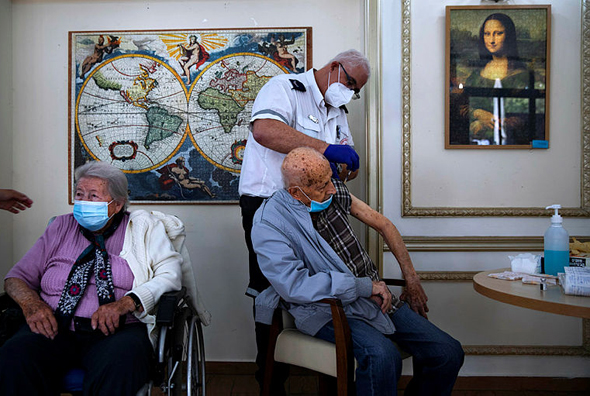Human experimentation oversight committee wants to approve Israel-Pfizer data-sharing deal
Does research to examine Covid-19 vaccine’s effectiveness at achieving herd immunity risk citizens’ privacy?
UPDATED
“It is vital to make clear that we support the Covid-19 vaccination effort, only that we ask that the rights of Israeli citizens are protected under the deal struck between Israel and U.S drugmaker Pfizer,” said Prof. Eytan Friedman, chairman of the Helsinki Committee, the statutory body that’s tasked with overseeing human medical trials in Israel.
More:
Israel’s one of a kind healthcare system is a rare opportunity for Pfizer
Q&A: How is technology and data helping Israel become the first country to vanquish Covid-19?
Israel’s Ministry of Health published on Sunday a redacted copy of a 14-page contract it signed with drugmaker Pfizer for the exchange of public medical data in return for the swift supply of Covid-19 vaccines. The January 6th deal titled: Real-World Epidemiological Evidence Collaboration Agreement, details the legal and logistical workings of the collaboration, including the sharing of publicly available and de-anonymized data with the objective being to ‘measure and analyze epidemiological data arising from the product rollout to determine whether herd immunity is achieved after reaching a certain percentage of vaccination coverage in Israel.”

Friedman was responding to an earlier report by Calcalist which stated that the agreement was signed without being first approved by the committee as is required.
The agreement came under criticism by privacy rights activists who claimed Israel was sharing personal medical information without securing the participant’s permission.
“The experiment taking place in Israel is not a clinical trial. The vaccine was approved based on clinical trials and the vaccination campaign has nothing to do with clinical trials. The argument is over a single thing, which is that as the chairman of the Helsinki Committee, some of whose members are lawyers who read the contract with Pfizer, we want to ensure that the committee is doing its job maintaining medical ethics, and making sure the rights and privacy of Israeli citizens are being protected also when clinical research, not trials, are being held. We do want to learn the results of the vaccination campaign and what the side effects are.”
Friedman made clear that he believes that the collaborative research required the committee’s approval. “We want to make sure that everything is done according to the regulations and that all required permits are received and we demand an urgent meeting with the health ministry,” he said.
If the committee were to resist the collaboration agreement, it could in an extreme case block the flow of data to Pfizer, or force the health ministry to determine whether they approve of their data being shared for research purposes.
- Responding to calls for transparency, Israel publishes contract of data-sharing vaccine deal with Pfizer
- “We’re lucky that the mutations only affected the rate of infection, they could have created a far more violent virus”
- Israel can use medical data to defeat the virus without violating people’s privacy
“Israel is taking part in research that will serve the entire world. It may be an altruistic thing to do, but the citizens of Israel should have been told about it,” said Dr. Tehilla Shwartz Altshuler, a fellow at the Israeli Democracy Institute, who supports the committee’s position.
The Ministry of Health said in response that “the agreement to share aggregate data with Pfizer, which was transparently shared with the public, details the data that would be shared with Pfizer in Appendix A and B. It contains official information on the pandemic similar to the infection figures distributed daily by the Ministry of Health to the general public and all healthcare agencies in the country. The shared data does not contain identifying details. The transfer of data to Pfizer is not an ‘experiment’ and does not require the permission of the Helsinki Committee.”



